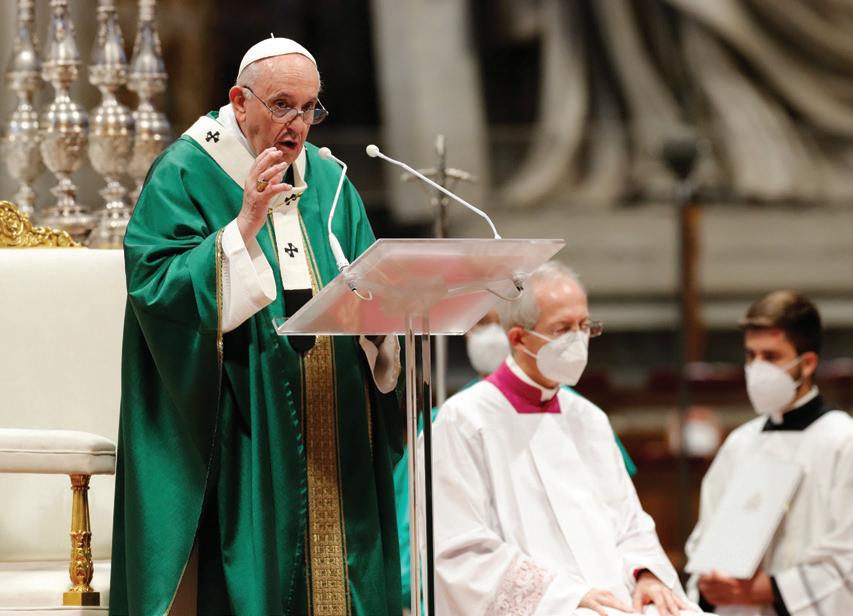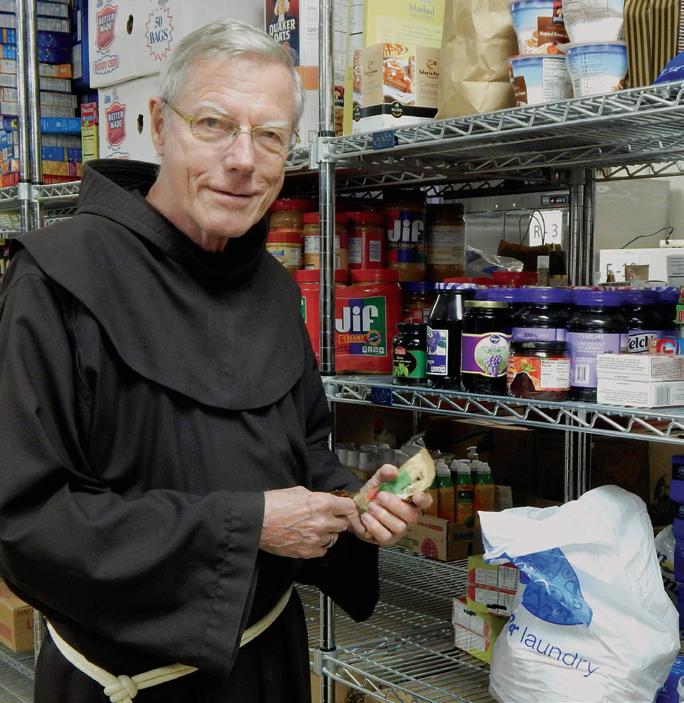
5 minute read
Ask a Franciscan
By Pat McCloskey, OFM
Pat McCloskey, OFM
Advertisement
Father Pat welcomes your questions!
ONLINE:
FranciscanMedia.org/ Ask-a-Franciscan
EMAIL:
Ask@FranciscanMedia.org
MAIL:
Ask a Franciscan 28 W. Liberty St. Cincinnati, OH 45202
All questions sent by mail need to include a self-addressed stamped envelope.
WANT MORE? Visit: FranciscanMedia.org/ Ask-a-Franciscan
WE HAVE A DIGITAL archive of past Q & As.
To get started, go to FranciscanMedia.org/ St-Anthony-Messenger/ Ask-Archives.
Material is grouped thematically under headings such as forgiveness, prayer, saints, sacraments, and Scripture.
Preparing for the 2023 World Synod of Bishops
I have seen a couple of articles about this synod. These articles suggested that it would be helpful to read (or reread) the Vatican II documents. Can you recommend a book describing what Vatican II was all about? Something in plain English without interpretation by the author?
First, start with the documents themselves. I suggest Vatican Council II: Constitutions, Decrees, Declarations, edited by Austin Flannery, OP (Costello Publishing). This inclusive-language translation is very readable.
“For a synodal Church: communion, participation, and mission” is the theme for this synod. Preparation documents are available via the synod link at Vatican.va.
Every book about Vatican II includes an interpretation. I highly recommend What Happened at Vatican II, by John W. O’Malley, SJ (Belknap Harvard).
If you read only the council’s final documents, you won’t know, for example, why the original draft of what became the Dogmatic Constitution on Divine Revelation was rejected by most of the bishops in November 1962, requiring years of extensive revision before its final approval on November 18, 1965.
I had Father O’Malley as a professor at the University of Detroit in 1970, a transformative experience. His recent and excellent memoir, The Education of a Historian: A Strange and Wonderful Story (St. Joseph’s University Press), includes memories of his doing doctoral-level historical research in Rome between 1963 and 1965, attending several council events and following its work. He was the first Catholic priest to receive a fellowship to the American Academy in Rome, where he wrote his PhD dissertation in history for Harvard.
If you want an even closer look at the council, you might enjoy My Journal of the Council, by Yves Congar, OP (Liturgical Press). Perhaps the busiest of the council’s periti (experts), he advised on the council’s preparation, worked during all four sessions on many of the council’s major documents, and was involved in the council’s implementation. Named a cardinal in 1994, Congar died the following year.
The synod, which will close in October 2023, was initiated last October. It will have a diocesan phase (October 2021 to August 15, 2022) and a later national/continental phase.
The word synod means “listening/journeying together.” In a sense, this synod is asking, “What is God asking of the Catholic Church in this time and place?” I think all of us need to ponder that question and our response. Answers to that question will certainly stretch everyone.
Pope Francis celebrates a Mass at the Vatican on October 10, 2021, to open the process that will lead up to the assembly of the world Synod of Bishops in 2023.
Satan’s Origins
Prior to becoming evil, when was Satan created? Did the rebellion of Satan and the fallen angels occur soon after the creation of humans?
Many people expect the Bible to say more about Satan than it does. Originally, the term meant “accuser.” Only later was he thought of as a single person. Many Christians are surprised to read in the Book of Job that Satan has easy access to God’s court (1:6–12 and 2:1–10).
Satan was created as an angel but rebelled. “I will not serve,” he famously says in John Milton’s Paradise Lost. In a sense, Satan illustrates this proverb from St. Gregory the Great, “The worst is the corruption of the best.” Satan’s rebellion must have taken place before the serpent tempted Eve in the Garden of Eden in chapter 3 of Genesis. Chapter 12 of the Book of Revelation refers to a battle between the Archangel Michael and Satan.
Is this required? Some Christians have fi rst names that are not those of a saint or a variant on a saint’s name.
This is customary but not required. Some Christians are named for virtues—for example, faith, hope, or charity.
Th e rule here is that a fi rst name should not be contrary to the Christian faith. Th us, for example, it would be inappropriate to baptize someone with the name Satan, adultery, murder, or something similar.
A saint’s name is no guarantee about how a person’s life will unfold, but it reaffi rms actions and values that are important and trustworthy.
Numbering the Ten Commandments
Why do the Ten Commandments of the Catholic Church and the Lutheran Church diff er from the Ten Commandments of most Protestant Churches?
They do not diff er in overall content but only regarding their numbering. According to Th e Catholic Source Book, the numbering used by Catholics and Lutherans dates to St. Augustine. Other Christians later divided the fi rst commandment and then united the fi nal two.
A third system begins with, “I, the Lord, am your God, who brought you out of the land of Egypt, that place of slavery.” Th at system combines the 10 commands into nine, leaving the total at 10.

Praying Quickly or Slowly?
A friend of mine says that she can pray an entire rosary while walking her dog around the yard. I know the size of her yard and don’t think I could pray one decade in that amount of time.
In my younger days, I could move rather rapidly through the rosary, saying all the right words without skipping a bead. Now I wouldn’t call those “prayerful moments.” I uttered all the right words, but it was more verbal chatter than words expressing my heart and soul. Does the speed of praying make a diff erence?
There is no prize for the person who fi nishes most quickly. Now you can make more connections between your life and the rosary’s mysteries than you could as a child. What truly matters is whether a prayer is opening you up to the movement of God’s grace in your heart.
Jesus told his disciples not to “babble like the pagans” (Mt 6:7) or to pray in order to be noticed (Mt 6:5–6). Th e speed with which one prays is not as important as the honesty and the compassion fostered by prayer.
a
that Reflects Your Values

Leave a legacy of mercy, compassion, and care for the poor through a bequest to our friars. For more information about including a gift in your will, call 513-721-4700 ext. 3219.
You are the heart of our ministry.
The Franciscan Friars, Province of St. John the Baptist 1615 Vine St, Ste 1 Cincinnati, OH 45202-6492










